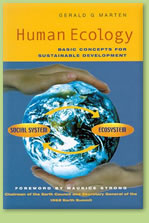EcoTipping Points
- How do they work?
- Leveraging vicious
cycles to virtuous - Ingredients for success
- Create your own
EcoTipping Points!
Stories by Region
- USA-Canada
- Latin America
- Europe
- Middle East
- South Asia
- Southeast Asia
- East Asia
- Africa
- Oceania-Australia
Stories by Topic
- Agriculture
- Business
- Education
- Energy
- Fisheries
- Forests
- Public Health
- Urban Ecosystems
- Water and Watersheds
Short Videos
- Saving a Coral Reef and Fishery (Apo Island, Philippines)
- Community Gardens Reverse Urban Decay (NYC, USA)
- Community Forests Reverse Tropical Deforestation (Thailand)
- Escaping the Pesticide Trap (India)
- Rainwater Harvesting and Groundwater Replenishment (Rajasthan, India)
How Success Works:
- Saving a Coral Reef and Fishery (Apo Island, Philippines)
- Community Gardens Reverse Urban Decay (NYC, USA)
- Community Forests Reverse Tropical Deforestation (Thailand)
- Escaping the Pesticide Trap (India)
- Rainwater Harvesting and Groundwater Replenishment (Rajasthan, India)

Human Ecology:
Principles underlying
EcoTipping Points
Video
Escaping the Pesticide Trap: Non-Pesticide Management for Agricultural Pests (Andhra Pradesh, India)
The economics of addiction can be summed up in a few words: Sell a product that makes buyers need it more. Cotton farmers in Andhra Pradesh had descended into a seemingly hopeless abyss of escalating pesticide dependence and debt. Suicides were becoming common. "Non-Pesticide Management" was the tipping point that brought health and hope to the farmers in Punukula village. Thousands of villages are now embarking on the same path.
- Producer: Damon Wolf
- Download: video-etp-pesticide.mp4 (80mb)
- Download this video script (pdf 35kb)
- Watch this video on Vimeo - https://vimeo.com/102673597
- Watch this video on YouTube - http://youtu.be/ve4QdJjxuPo
- Comprehensive description of this case
- Explanation of Ingredients for Success in this case
- “How Success Works” educational materials for this case

